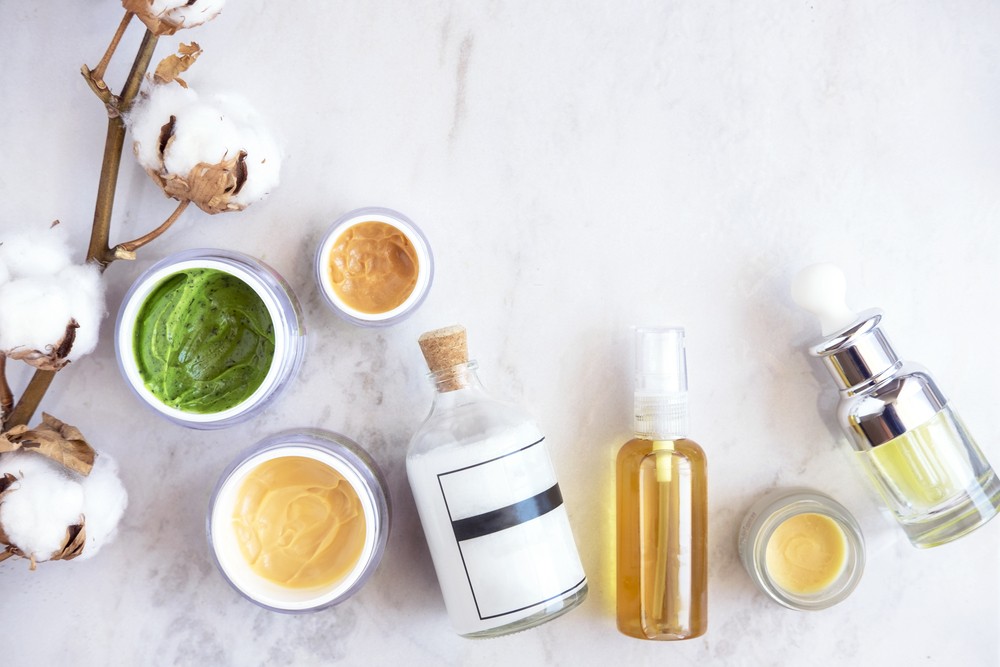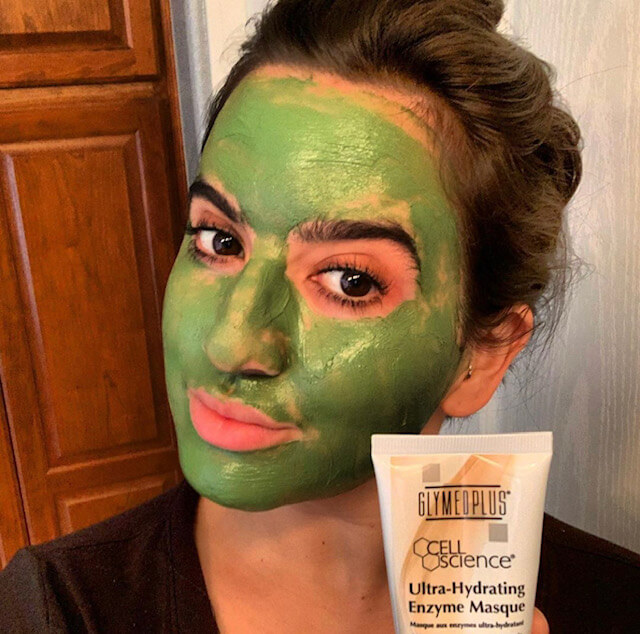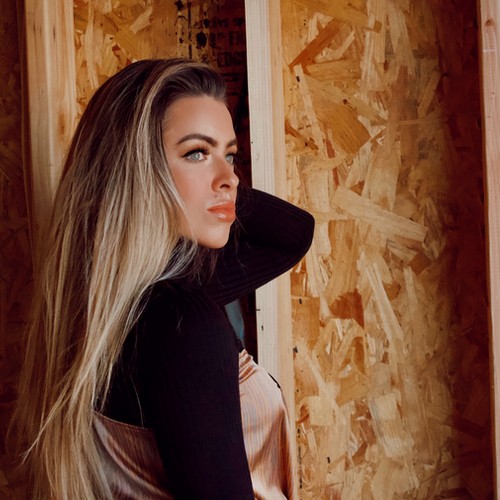Smarmo. It’s the name I gave the zit on my chin. Sometimes, when I’m really put off by a breakout, I’ll give it a name and welcome it into our home.
“Hello, Smarmo,” I’ll smile in the mirror with my chin tilted up to get a nice visual, “I’ll make sure to be a gracious host while you’re here, but this must be a very brief visit, okay?”
Matthew will greet it with usual pleasantries, and we’ll all go about our day.
But as much as I can joke about it, if I could pick one thing to change about myself, it would be to have perfect skin. Is that vain? Yeah, sure… maybe, but it’s also deeply honest. I can talk pretty openly about my mental health, my transgressions, or trauma that I’ve experienced, but my kryptonite… my Achilles heel, what makes me most vulnerable, is my skin.
When Dax [Shepard] said he’s good at talking freely about all his downfalls, but not what he’s currently battling, it really resonated. I think we tend to share our vulnerable experiences with others once we’ve overcome them.
And it may sound silly to those of you with flawless skin, but man, let me tell you, feeling so helpless living in your own skin can be infuriating some days, heartbreaking other days, and straight-up comical when you’ve lost the steam to care.
I’ve seen countless YouTube videos about how people have overcome their cystic acne, by changing their diet, fixing their hormone imbalance, taking new supplements… which is all great – inspiring, even, but I climbed that hill a while ago (despite the mask’s best efforts). My problem has been and continues to be with scarring.
I’ve bought all the collagen creams, OTC red-light devices, had laser treatments, microdermabrasions, subcision, and more laser treatments…
“This is going to be the time all my skin problems are solved,” I would tell myself on the way to an appointment.
“This is all going to be worth it,” I would say in the mirror as I scrutinized the red lines running down my cheeks after getting home.
Here’s where I say something inspiring like, “but now, I’ve learned to love myself and learned to let go of the things I can’t control.” That wouldn’t be the truth, though. The truth is, I’m bettering myself in all other areas of my life and I get frustrated when my skin doesn’t follow suit. Has it improved significantly? Sure… but it’s still my greatest insecurity.
So, now that I’m all out in the open, it should come as no surprise that the person you’re hearing from today is none other than the incredibly talented, passionate, and beautiful, Caitlin Teich.
“Hey, Caitlin,” my text started, “I know I’ve already interviewed you, but I want to talk about proper skin care, and seeing as you’re my aesthetician, I think it would only be right that I interview you again… are you in?” I asked, crossing my fingers and squeezing my butt as I awaited her response.
And then she said no – she was busy.
Kidding, obviously… we connected over Zoom and let me tell you, I was having a good skin day – case in point.
Don’t @ me… I have Airpods, okay? I just don’t like using them with my laptop.
“Alright, Caitlin, since we talked about your upbringing in our first interview, we’re going to skip right on over that and just dive in,” I smiled and wished we were in person so I could squeeze her… but not too tight, because I know her back wouldn’t forgive me.
“I’m going to start by reading one of the recurring questions that came through on Instagram and just ask, ‘what’s the deal with clean beauty?’”
She pushed her thin, black-framed glasses up on her nose (I almost said a smidge) and laughed.
“Okay, so let me start by saying this… we live in a consumer-driven society that’s always looking for the next best thing or that “quick fix” but skin care is a 38 BILLION dollar industry and estimates show it will grow to $750 billion by 2025. It is one of the most competitive industries and social media is making it easier and easier to sell. We look at influencers with perfect skin, there are filters to make you look like a Kardashian and face tune that makes you look like a china doll. These are impossible standards to meet, however that doesn’t stop us from trying, does it?” she paused for a moment.
“My generation (millennials) is the most consumer-driven generation. We are the easiest targets. We love supporting companies that give back or make us feel like we are fighting for a cause. Going green or using natural products to help our beautiful earth. Companies feed off of that and make us feel like we are not only helping ourselves but supporting a cause or an idea.”
Obviously, skincare companies have to find a way to make their product different and stand out so they can compete against so many other lines. Natural and organic skincare is old news now, so… roll out the red carpet for (drum roll) CLEAN BEAUTY!
Who doesn’t like the sound of clean beauty? I mean, as opposed to what? Dirty beauty? I think everyone wants to only put “clean” things on their face, but what does this actually mean?
“NOTHING. It means nothing and let me tell you, nothing bothers me more than companies using fear-marketing to sell products and make a buck…or millions for that matter,” Caitlin scoffed.
Notice when you look at a product that says “clean beauty,” instead of saying what amazing ingredients are in the product, it usually has a list of ingredients it’s made without.
Made without: parabens, sulfates, fragrances, harmful chemicals, gluten-free (in case you want to eat the cream?), made without any ingredients that are actually going to make a difference.
“Oh wow, okay, so whenever we see Paraben-Free on skincare products, that’s just a marketing ploy?” I asked with concern.
“Not a ploy exactly, because while the product may be paraben-free, it will still have some sort of preservative in it. Basically ‘this product is clean if it is made without these specific ingredients.’ But are these ingredients actually bad? The answer is no, they are not. Parabens are a common preservative but have become taboo over the years. However, in 2019, parabens were voted the #1 non-allergen of the year by the American Contact Dermatitis Society. Other natural preservatives like citric acid, rosemary, lemon juice, sugar, salt, and grapefruit seed extract are much more likely to create an allergic reaction, irritation, and even contamination with microbes in the product,” she answered, blowing me away with her proficiency.

“There is absolutely no regulation on clean beauty. Any company can make this claim without ramifications. Also, keep in mind, the word chemical scares a lot of people, however, water is a chemical and we need water. Don’t buy a product because you think it’s ‘clean’ as I promise you will be disappointed.”
She enlightened me further by explaining what can happen when ingredients get banned, like Hydroquinone (got banned in Europe), which is a skin bleaching agent that you can no longer buy over the counter but are still able to get through a physician or med spa. Apparently, they tested it on rats via IV (not topically, like we would) giving them doses at ten times their actual body weight, and the results deemed that Hydroquinone might lead to skin cancer.
I raised my eyebrows before asking, “okay, so do you think some of these brands know what result they want prior to testing? Like, they want to eliminate a certain ingredient for marketing purposes, so they operate in a way that will…” I trailed off as I watched her nod in agreement.
“Yep… correlation doesn’t always equal causation. No two people have the same set of genes or circumstances. Of course, injecting something directly into your bloodstream that should go on topically is going to be problematic and result in a different outcome,” she raised her hand as if to say ‘duh.’
I asked about any ingredients the masses should avoid…
“I really don’t believe there are tons of “bad” ingredients in most skincare lines, but there are problems with how the ingredients are formulated.”
“So, I get why people would want to eat organic… but why is it important for people to use organic skincare?” I asked genuinely.

“Well, the power of marketing, really… we think organic means we’re like eating a salad, but for our face, but the truth is, the majority of organic or botanically-driven skincare lines will have the most adverse reactions – chemical burns, allergens, irritations… people need to get it out of their head that synthetic is bad. Arsenic is natural but it’s bad for us. It really is just how the companies are playing on what we care about,” she shrugged and shook her head.
She continued.
“It’s not like medical-grade companies have access to all these ingredients that other brands don’t have access to, it’s about formulas and delivery systems. Chemists work to realize how a product’s efficacy will change once it hits the skin.”
“If you look at the back of a product label, the top part of the row will be the top ten percent of most active ingredients in the product, while the bottom part is completely unregulated,” she pointed to a piece of paper that she’d recently received from the pharmacist. “So, for instance, if there’s even a tiny drop of Vitamin C in the product, they can put it more towards the top because they know consumers tend to buy Vitamin C… it’s why the medical-grade products are more expensive – because they’ve put the ingredients together in the most effective way possible,” she advised and I could sense how many skincare companies would want Caitlin as their product rep.
Our conversation naturally evolved into moisturizers because who doesn’t love when they find the perfect face lotion that makes their skin feel plump and dewy af?
“Something for people to realize when they feel like they have sensitive and dry skin is that most people naturally have oily skin… the dryness is usually a lack of exfoliation, which we need as we get older because things start slowing down. Typically, skin cells would come to the surface and shed every 28 days, but good ‘ol aging starts taking a toll, so please, for everyone experiencing dry skin – EXFOLIATE first, otherwise, moisture is just going to trap in the dead skin, clogging everything up.”
Did the lightbulbs just go off for you all? Yeah… same. Why weren’t we informed of this forever ago?
“Okay, Cait, so are there any good over the counter skin-care lines out there?” I asked what I’m sure everyone’s thinking (outside of ‘what am I hungry for?’)
“Yes, there are but I don’t typically like to recommend something until I see someone in person, which is why it makes me cringe when I see influencers blanketly telling their followers that a certain brand ‘works’ but if you were to make me suggest a more affordable brand, I would probably go with Skin Scripts. While it’s not super corrective, it’s much better than using something like Oil of Olay,” she offered while adjusting in her chair.
I could sense her back was screaming at her, which you’ll know why if you read her first interview.
“So, for the person who’s either a novice or doesn’t have skin problems and just wants to take preventative measures… what steps would you suggest they take?” I asked, while pointing out the fact that Caitlin has perfect skin and does SO much to keep it that way.

“Okay, so that’s gonna be a cleanser, obviously, an antioxidant, and a sunscreen (not the stuff in your makeup),” she stated confidently, stressing the fact that the antioxidant is important to help prevent cellular death that occurs when we’re out in the sun, when we open an oven… just doing the day to day, really.
Yeah, Alex [Jeopardy], I’ll take ‘No Cellular Death’ for 5000, please.
Side note – for those looking for an antioxidant, Skin Better Alto Defense has the best on the planet.
I asked Caitlin to expand on her suggestions, because I know she’s riding down the true path to great skin health.
She laughed before answering, “yep, there’s always going to be good, better, and best. With the best, you should be using a cleanser, an exfoliant (chemical and manual), a toner/oil control, antioxidants, serums/corrective products, and sunscreen, but of course those would be specific to the person because if we’re looking at someone with cystic acne, there are certain acids we wouldn’t want to layer on top of each other,” she explained.
“Okay, yes, that makes sense, but what about actual procedures? And before you say anything, I KNOW laser hair removal is number one!” I clapped my hands to express my appreciation.
Seriously, guys, I can’t tell you how much of a game-changer getting laser hair removal has been – it makes SUCH a difference in the texture and it’s pretttttty clutch not having to deal with a female mustache and chin pokies.
Back to Programming
“So, I’m going to start with the usual and say that everyone’s different. When I first see someone, I go over everything; what products they’re currently using, lifestyle, diet, medical history, medications, previous treatments… I never jump right into laser treatment. The best place to start is a consultation and then I clean out the skin and get a feel for how it reacts. From there we’ll formulate a treatment plan; we can start scheduling monthly appointments like dermaplaning or oxygenating facials, then quarterly laser treatments like ResurfX or microneedling with prp, then yearly would be something like your Co2 laser and ultherapy,” she advised.
“Something I think we should also talk about is our food intake because it’s something I didn’t realize it had such an impact on my skin until my mid 20’s… as you know, once I eliminated dairy, it was like woah, hello brighter skin… hello, minimal breakouts!” I moved my hands towards my face to display like I was Vanna White.
Sorry for all the old game-show references, guys… I don’t know what’s with me, but just go with it.
Caitlin confirmed how much time it takes for most food to hit the skin because to this day, I thought I could eat cheese or a cookie full of sugar and see it on my face the following morning…
“It typically takes two weeks for food intake to show up in your skin, so if you suddenly have a breakout, think back to what you ate two weeks ago,” she suggested.
Luckily, we take pictures of everything we do, so that shouldn’t be too difficult these days.
PS – top three things to avoid to help your skin – dairy, sugar, and gluten… I know, the only things you want to eat. I watch The British Bake Off and salivate at all the desserts that would destroy my face, but hey, to each their own… I know many people that can eat pizza and ice cream and their face is perfectly clear. Also, damn them.
“Alright, let’s get into ‘audience’ questions now… someone asked how much of our skin is genetic?” I raised my eyebrows to suggest I was eager to know.
“I don’t have an exact number but a lot of it is genetic,” she answered, “I actually work on a family that all has cystic acne, but there’s a lot we can do to improve our skin despite whatever deck of cards we were dealt.”
Readers note – I found several studies done on skin genetics – some say 75% of our skin is genetic, some say 60%, but either way, it’s a lot, so I guess just ignore everything we’ve said and go to Target for some Oil of Olay and Hostess cupcakes.
Bye.
Just kidding.
“It’s actually crazy how much you know, Caitlin,” I leaned my chin on my fist and continued, “so, Misses All-Knowing, what would you suggest to people who are frustrated that they keep breaking out under their mask, because I imagine they’re here to stay far into 2021…” I trailed, thinking how strange it will feel once we can all be in a store with our full face.
“Well, bacteria loves warm and wet places, so make sure you have a good mask for starters, but if you feel a deep breakout coming on, the pimple patches actually work really well. Also, if you can avoid wearing makeup under your mask, that’s going to be ideal. Oh, and do NOT keep wearing your mask without washing it… I see people throwing it in their purse and reusing it day after day – it’s actually disgusting.”
Last audience question – yes, we’re only doing three – this thing is getting long, guys.
“Someone asked what they can do to shrink their pores – they’ve tried different exfoliants and toners and nothing seems to be working.”
“Your pores are your pores,” Caitlin pushed her lips together to suggest there’s not much you can do, “pores aren’t a muscle – they don’t shrink and expand, but most people with larger pores have an oil problem, so it’s important to get extractions on a monthly basis and use active ingredients. Also as we age, collagen and elastin start to deplete, so as they relax under the skin, the pore starts to open up more and appears bigger,” guys, she used her hands to show a visual and it all made so much sense.
“Okay, my love, we certainly have plenty here, but if you have any closing thoughts, the floor is yours,” it’s taking everything in me not to mention the Presidential Debate…
“I’ll just say, if your skin is important to you, make the time for it. Establish a relationship with someone you trust and take their direction. I’ve been working in this industry for 12 years and I know what works for people suffering from different skin problems/diseases. Also, just remember, when you’re switching to a new product, whether it’s medical-grade or not, it’s important to stay on the path for at least two months. A lot of people think they’re allergic to something, but really, their skin is just working and purging everything that’s been sitting below the surface. That’s why it’s important to have an aesthetician who can tell the difference,” she urged before reiterating that she understands how expensive it can be.
Post-interview addition by the formidable Caitlin –
Also, for anyone suffering from acne, just realize it’s the most common skin condition in the US, affecting 50 million Americans every year. It’s nothing to be ashamed of and doesn’t mean you’re not taking care of yourself.
When a client comes in to see me and feels defeated because they’ve ‘tried everything,’ it’s heartbreaking, but treating acne is one of my specialties and it’s the most rewarding. I’ve had clients tell me they don’t date, or leave the house to hang out with friends because they are so insecure about their acne. I really do take pride in helping people find their confidence.
Back to interview
“Having great skin can be pricey as we continue to age… the great thing is that no one’s forcing us to care about our face, unless maybe you’re an actor. I’m just here to help educate people and make sure we’re achieving whatever goals they have for their skin,” she concluded confidently.
And with that, mention my name and you’ll get 100% off your consultation with Caitlin at Adam & Eve Aesthetics. JK, the consultation is free anyway, but you can still mention my name if you want to?
Now, here I sit, trying to come up with a satisfying ending, only to be staring at Caitlin’s crisp white shirt and perfect skin. So, I guess I will tell you all to respond to her, thanking her for sharing her knowledge because I definitely learned a lot and expect to be back to my toddler skin in no time.
*Final note from the expert*
Feel free to reach out to me with specific questions or concerns because I could talk about skin all day long. It is my passion and this industry is ever-evolving. And just remember, it’s not about perfect skin, it’s about healthy skin.




